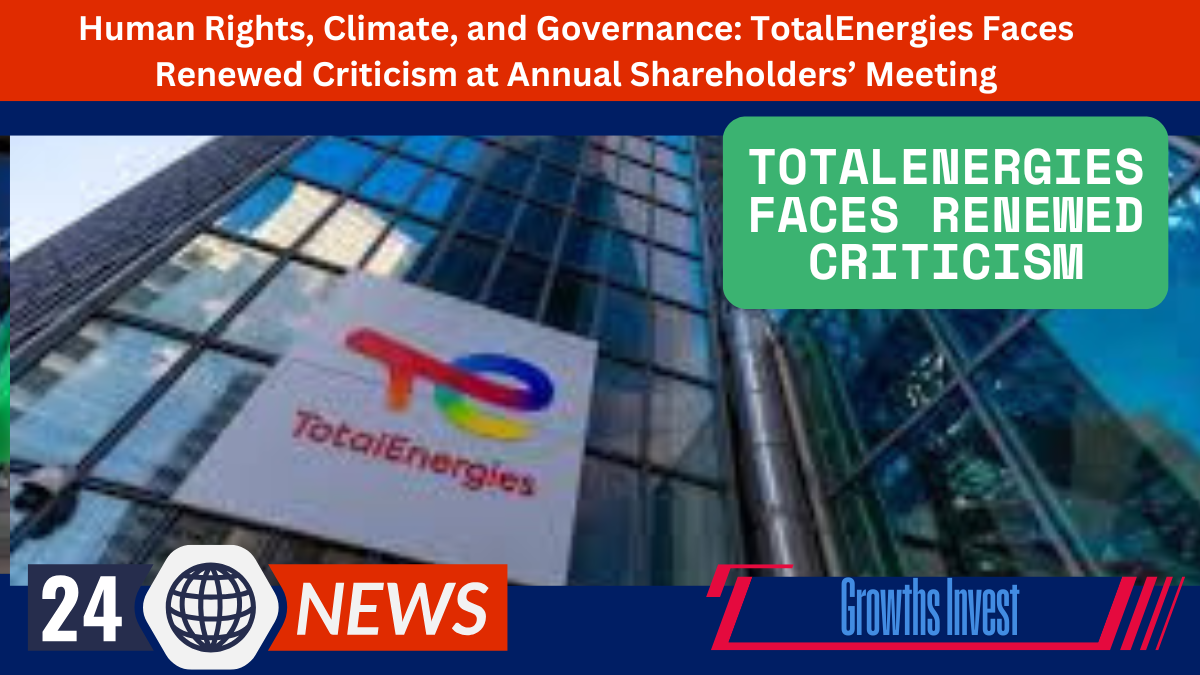TotalEnergies’ annual general meeting (AGM) was anything but quiet this year, as the energy giant once again found itself under intense scrutiny. Held this Friday, May 23, at the company’s high-security headquarters in La Défense, the event was marked by shareholder dissent, controversial board nominations, and renewed outcry over the company’s human rights record and climate policies.
Following a pattern seen in previous years, the 2025 AGM unfolded under a cloud of controversy. The company has become a lightning rod for criticism from environmental advocates, human rights groups, and governance watchdogs—criticism that continues to grow louder as TotalEnergies pushes forward with its global operations, many of which remain deeply tied to fossil fuels.
Security Tightened, But Tensions Uncontained
In recent years, TotalEnergies’ AGMs have been the site of vocal protests, particularly from environmental organizations. To prevent a repeat of the disruptive demonstrations that marred its 2023 and 2024 meetings, the company opted to relocate this year’s gathering to its fortified offices in the business district of La Défense, just outside central Paris.
But the change of venue did little to dampen tensions.
Inside the meeting hall, discontent simmered, particularly over the nomination of Laurent Mignon, the former Chairman of the Management Board at French banking group BPCE, to TotalEnergies’ board of directors. Mignon’s proposed appointment stirred unease due to his banking group’s historic ties to the fossil fuel industry—BPCE is one of the significant financiers of TotalEnergies itself.
His nomination to replace outgoing board member Jean Lemierre, chairman of BNP Paribas, drew sharp criticism from proxy advisory firms such as Institutional Shareholder Services (ISS). ISS flagged concerns over Mignon’s existing slate of external mandates, suggesting he may be overstretched and unable to commit the necessary time and focus to the role.
And shareholders listened. Mignon’s nomination passed—but only narrowly—with just 57% of shareholders voting in favor, a stark indicator of the growing impatience and pushback within the investor community.
Climate Strategy and Human Rights Under the Microscope
Although no formal resolutions related to climate change were on this year’s agenda, environmental and human rights issues nonetheless dominated the conversation. Several shareholders used the meeting to express concern over the company’s continued investments in oil and gas projects, despite its public commitments to reducing emissions and transitioning to cleaner energy sources.
The gap between TotalEnergies’ rhetoric and reality was a recurring theme throughout the event. While the company has laid out a roadmap to carbon neutrality by 2050, critics argue that its short- and medium-term actions don’t align with that vision. Instead of aggressively scaling down fossil fuel operations, TotalEnergies continues to launch new projects in oil-rich regions, including parts of Africa and the Middle East—some of which have drawn allegations of environmental degradation and human rights violations.
Shareholder advocacy groups and NGOs have long pointed to evidence that local communities in these areas have faced displacement, water contamination, and restricted access to basic resources due to the company’s operations. These accusations have added fuel to the fire, drawing international attention and compounding the reputational risks TotalEnergies faces.
A Company Caught Between Worlds
TotalEnergies finds itself in a uniquely challenging position. On one hand, it remains one of the largest and most powerful energy producers in the world, deeply rooted in traditional fossil fuel markets. On the other, it has publicly committed to leading the transition to low-carbon energy, a move that reflects both investor expectations and mounting regulatory pressure from the European Union.
The contradiction at the heart of the company’s strategy—pursuing net-zero goals while continuing to expand oil and gas projects—has become increasingly difficult to reconcile. And it’s not just NGOs or environmentalists raising the alarm. Major institutional investors and financial advisors are beginning to demand greater transparency and stronger action from companies like TotalEnergies.
“The markets are watching,” said one fund manager representing a major European pension fund. “If TotalEnergies wants to remain competitive and credible, it must do more than talk about climate—it must act on it.”
A Broader Trend in Corporate Accountability
The scrutiny faced by TotalEnergies is emblematic of a broader shift in global finance. Investors are no longer satisfied with vague pledges or long-term promises—they want immediate, verifiable steps toward sustainability and responsible governance.
In the wake of regulatory crackdowns on greenwashing and mounting public pressure, companies are under increasing obligation to prove that their business practices align with their stated values. For TotalEnergies, that means not just setting emissions targets, but demonstrating real progress; not just acknowledging human rights concerns, but implementing safeguards and remedies on the ground.
At this year’s AGM, shareholders sent a message that couldn’t be ignored: good governance is no longer optional, and the days of business as usual are numbered.
Looking Ahead
As TotalEnergies continues to navigate the delicate balance between profit and purpose, the company faces mounting internal and external pressure to evolve.
Laurent Mignon’s narrow confirmation to the board may have passed, but it stands as a clear warning. The investor base is becoming more vocal, more sophisticated, and more demanding. Stakeholders want to see alignment between leadership, strategy, and sustainability—not just in words, but in measurable action.
Meanwhile, activists and advocacy groups are likely to continue turning up the heat. With global attention focused on corporate responsibility and climate justice, TotalEnergies—and its peers in the oil and gas sector—can expect their AGMs to remain focal points of debate, protest, and public scrutiny.
For now, TotalEnergies’ annual meeting has come and gone. But the conversation around its future is far from over. Whether the company can truly transform in the face of growing demands remains to be seen. What is certain, however, is that shareholders and the wider public are no longer willing to accept half-measures.

